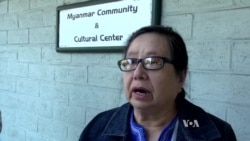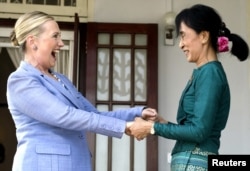Burmese Americans are a small, but growing diaspora in the United States, but among those who have become citizens and plan to vote, many say their homeland experiences will impact whom they vote for in the U.S. general election in November.
According to State Department data, nearly 160,000 refugees from Myanmar, also known as Burma, have resettled in the U.S. over the past 10 years. That represents over half of the estimated 300,000 total Burmese living in the U.S.
For many of those who have recently arrived, there are more important concerns, such as learning English or putting food on the table, than the U.S. presidential politics of Democrat Hillary Clinton or Republic Donald Trump.
Memories
When Phyu Phyu Hlaing looks at Trump, she sees more than just the man she won’t vote for in November. For the Burmese American mother of two, the Republican nominee brings up painful memories from her distant past.
"Coming from a country like Burma, Donald Trump reminds me of a military-style leader," says Hlaing, who left her homeland in 1983 and watched it deteriorate under the rule of clumsy and oppressive military dictators.
“He just wants to get rich, and he’s out to clean house,” adds Hlaing, a stay-at-home mother of two, who is active in the Bay Area of California’s small, but vibrant, Burmese community.
Nearly a year ago, in a landslide vote, Myanmar ushered in its first civilian-led government in more than five decades.
Hlaing, a U.S. citizen, last year had to reassure her fourth-grade daughter after school friends said Trump was planning to kick immigrants out of the country. Though an over-simplification of Trump’s views, the event left her shaken.
“The stuff he says, the things he does, it actually makes me worry that I might have to move back to Burma one day,” Hlaing says with a nervous smile that suggests she is only half-joking.
Such animosity towards Trump is not uncommon among Burmese Americans, a relatively small diaspora dominated by recent arrivals.
Political reforms
Many Burmese, such as Htet Wint, a college student from Fremont, California, express warm feelings toward Trump’s opponent, Democrat Clinton, who as secretary of state helped encourage political reforms in the Southeast Asian country.
"I think it would be very helpful to have an American president who really knows Burma," says Htet.
Clinton made a landmark visit to Myanmar in 2011, meeting with longtime democracy leader Aung San Suu Kyi, who had just been released from house arrest and is now the country's de facto leader.
As the country's generals gradually became more open to democracy, Clinton was one of the main proponents of reengaging with and lifting the sanctions against them.
Clinton has occasionally touted Myanmar's progress as one of the crowning achievements from her time as secretary of state. In her 2014 memoir, she devotes an entire chapter to her diplomatic efforts there.
Though the country still faces severe human rights challenges and is far from a model democracy, conditions have vastly improved, and many Burmese attribute at least some of that success to Clinton.
"(Clinton) was very open to the fact that the Burmese government wanted to express change and open up society,” says Htet. "She did play a major role in that."
An achievement for Clinton?
But while Myanmar is clearly a crucial part of Clinton's legacy as secretary of state, is it really such a clear-cut foreign policy achievement?
The reality is more complicated than that, says veteran Myanmar expert Lex Rieffel, a nonresident senior fellow at the Brookings Institution.
"I have a serious problem attributing or giving credit to any single person, country, or factor in situations that are very, very complex," Rieffel says.
While the Clinton and Obama strategy of reengagement had a positive effect, the ultimate credit belongs "to the people of Myanmar and to some extent the military, which allowed this transition to start," he says.
In any case, Clinton's diplomatic approach to Myanmar is unlikely to weigh heavily on the minds of very many U.S. voters come election day, in Rieffel's estimation.
For Burmese Americans, though, it could be a different story, at least to the extent that anecdotal evidence matters. In interview after interview, Burmese Americans told VOA they approved of Clinton's experience with Myanmar, and especially her relationship with Aung San Suu Kyi.
Conservative roots
In reality, though, it's hard to know exactly what percentage of Burmese Americans support Trump or Clinton, since there hasn't been a poll measuring their political opinions. The closest is a study on civic participation conducted this year by the Burmese American Community Institute in Indianapolis, Indiana.
Interestingly, the study's authors concluded the U.S. Burmese community is actually conservative on social and other domestic issues. That's partly because most Burmese in the U.S. were members of religious or other conservative ethnic minorities that were persecuted in their home country, it said.
"They are more in line with Republican ideology,” says Elaisa Vahnie, BACI's executive director. "But now with Trump, it's a very difficult situation for them."







